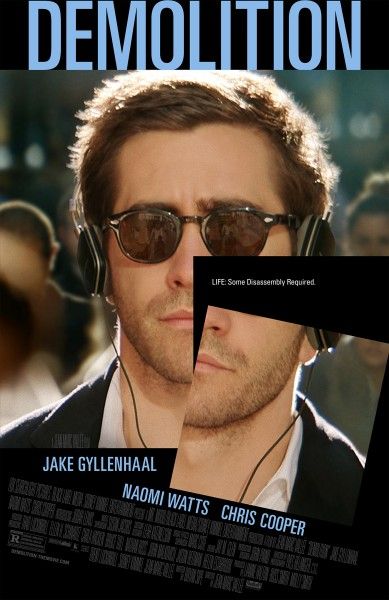Plenty of films can be summed up as “rich white people problems”, but director Jean-Marc Vallée’s quirky drama Demolition is one of the more glib offenders. While Jake Gyllenhaal has been on a streak lately of shining in complex, diverse roles, even an impressive leading turn from the actor can’t overcome an intensely miscalculated screenplay and cloying plot twists that result in a frustrating, confounding “redemptive story” with little redemption to be found.
In Demolition, Gyllenhaal plays Davis Mitchell, a successful investment banker whose wife Julia (Heather Lind) suddenly dies in a car accident, leaving him in an extended state of shock. Instead of mourning the loss as most people would, Mitchell instead is wholly ambivalent about the event, choosing to devote his utmost concentration to writing complaint letters to a vending machine company about a package of peanut M&M’s that failed to drop into the bucket. As a result of this odd correspondence—during which he continues to go to work and act as if his wife didn’t just die—Mitchell divulges (quirkily, I must add) details of his life with the utmost candor and subsequently receives responses from Karen Moreno (Naomi Watts), the company’s customer service representative who has been moved by Davis’ story.
Davis and Karen eventually meet up and begin a friendship (which, to the film’s credit, never crosses the line into full-on romance), as Davis’ behavior becomes more and more eccentric. Spurred by advice from his father-in-law/boss (Chris Cooper) about how one mends something by taking it apart to see what needs fixing (yes, the theme of the film is literally spelled out by a character), Davis begins physically dismantling appliances and electronics throughout his house, office, and even other people’s houses. His quirky journey of self-discovery continues with more quirky behavior as he befriends Moreno’s quirky teenage son (Judah Lewis), meets quirky strangers, and dances quirkily on the subway.
But the trouble with Demolition is that all the quirkiness in the world can’t make up for the fact that Davis, quite frankly, sucks, even though the film continually tries to make him charming and endearing. Not only does he admit that he never really paid attention to his wife, but it’s easy to forego all responsibilities (eg. work) and destroy everything you own when you live in a fancy house, drive a Porsche, and draw a massive salary for a job you only hold due to nepotism. He’s an unlikeable guy, and while Gyllenhaal takes the character to some interesting places (where he unexpectedly shines), his redemptive arc feels wholly unearned due to the unshapely structure of Bryan Sipe’s script.
As for Watts, it’s refreshing that Moreno doesn’t serve the “love interest” role, but the character gets the short-shrift anyway—though at least her purpose isn’t entirely to exist in service of Davis’ arc, like Julia. There are some bright spots in the film to be found, mostly owed to Gyllenhaal’s manic performance and the relationship between Davis and Moreno’s son, with Lewis delivering a promising turn as a troubled teen. But that, too, is ultimately hindered by the fact that Davis is a careless, unstable guy who the film thinks is a quirky good-guy-in-the-making.
The disappointment of Demolition is all the harder to take given that Vallée is coming off the fantastic and immensely moving Wild, and Gyllenhaal is on a terrific tear of inhabiting a fascinating array of characters. It’s tough to see how such a miscalculated effort could come from this duo, and it’s all the more frustrating when brief moments of inspiration arrive.
There’s nothing wrong with telling the story of an unlikeable guy who, over a journey of self-discovery, comes to turn his life around and realize what a jerk he’s been—we’ve been telling this same story for centuries—but there’s a fine line to walk between unlikable and irredeemable, and despite characteristically excellent work from Gyllenhaal, Demolition is miles away from this line. The fact that the film thinks it’s got this balance down may be its biggest sin, mistaking quirk for endearment and drowning the whole thing in pomposity. You need not break Demolition apart to see what needs fixing—its issues are clear, and irreparable, from the onset.
Rating: D+




